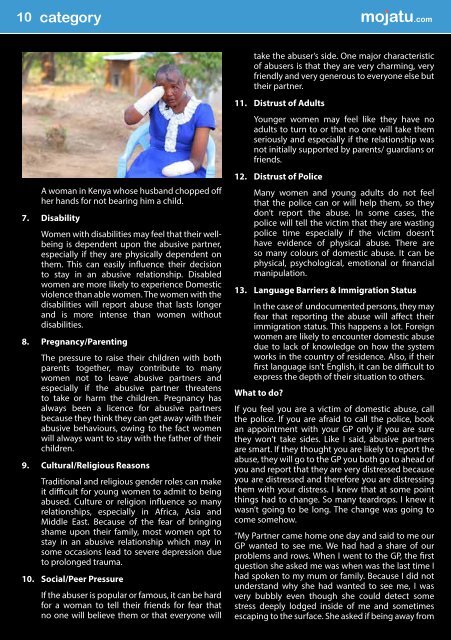Mojatu Berkshire Magazine Issue B011
Create successful ePaper yourself
Turn your PDF publications into a flip-book with our unique Google optimized e-Paper software.
10 category<br />
mojatu.com<br />
take the abuser’s side. One major characteristic<br />
of abusers is that they are very charming, very<br />
friendly and very generous to everyone else but<br />
their partner.<br />
A woman in Kenya whose husband chopped off<br />
her hands for not bearing him a child.<br />
7. Disability<br />
Women with disabilities may feel that their wellbeing<br />
is dependent upon the abusive partner,<br />
especially if they are physically dependent on<br />
them. This can easily influence their decision<br />
to stay in an abusive relationship. Disabled<br />
women are more likely to experience Domestic<br />
violence than able women. The women with the<br />
disabilities will report abuse that lasts longer<br />
and is more intense than women without<br />
disabilities.<br />
8. Pregnancy/Parenting<br />
The pressure to raise their children with both<br />
parents together, may contribute to many<br />
women not to leave abusive partners and<br />
especially if the abusive partner threatens<br />
to take or harm the children. Pregnancy has<br />
always been a licence for abusive partners<br />
because they think they can get away with their<br />
abusive behaviours, owing to the fact women<br />
will always want to stay with the father of their<br />
children.<br />
9. Cultural/Religious Reasons<br />
Traditional and religious gender roles can make<br />
it difficult for young women to admit to being<br />
abused. Culture or religion influence so many<br />
relationships, especially in Africa, Asia and<br />
Middle East. Because of the fear of bringing<br />
shame upon their family, most women opt to<br />
stay in an abusive relationship which may in<br />
some occasions lead to severe depression due<br />
to prolonged trauma.<br />
10. Social/Peer Pressure<br />
If the abuser is popular or famous, it can be hard<br />
for a woman to tell their friends for fear that<br />
no one will believe them or that everyone will<br />
11. Distrust of Adults<br />
Younger women may feel like they have no<br />
adults to turn to or that no one will take them<br />
seriously and especially if the relationship was<br />
not initially supported by parents/ guardians or<br />
friends.<br />
12. Distrust of Police<br />
Many women and young adults do not feel<br />
that the police can or will help them, so they<br />
don’t report the abuse. In some cases, the<br />
police will tell the victim that they are wasting<br />
police time especially if the victim doesn’t<br />
have evidence of physical abuse. There are<br />
so many colours of domestic abuse. It can be<br />
physical, psychological, emotional or financial<br />
manipulation.<br />
13. Language Barriers & Immigration Status<br />
In the case of undocumented persons, they may<br />
fear that reporting the abuse will affect their<br />
immigration status. This happens a lot. Foreign<br />
women are likely to encounter domestic abuse<br />
due to lack of knowledge on how the system<br />
works in the country of residence. Also, if their<br />
first language isn’t English, it can be difficult to<br />
express the depth of their situation to others.<br />
What to do?<br />
If you feel you are a victim of domestic abuse, call<br />
the police. If you are afraid to call the police, book<br />
an appointment with your GP only if you are sure<br />
they won’t take sides. Like I said, abusive partners<br />
are smart. If they thought you are likely to report the<br />
abuse, they will go to the GP you both go to ahead of<br />
you and report that they are very distressed because<br />
you are distressed and therefore you are distressing<br />
them with your distress. I knew that at some point<br />
things had to change. So many teardrops. I knew it<br />
wasn’t going to be long. The change was going to<br />
come somehow.<br />
“My Partner came home one day and said to me our<br />
GP wanted to see me. We had had a share of our<br />
problems and rows. When I went to the GP, the first<br />
question she asked me was when was the last time I<br />
had spoken to my mum or family. Because I did not<br />
understand why she had wanted to see me, I was<br />
very bubbly even though she could detect some<br />
stress deeply lodged inside of me and sometimes<br />
escaping to the surface. She asked if being away from


